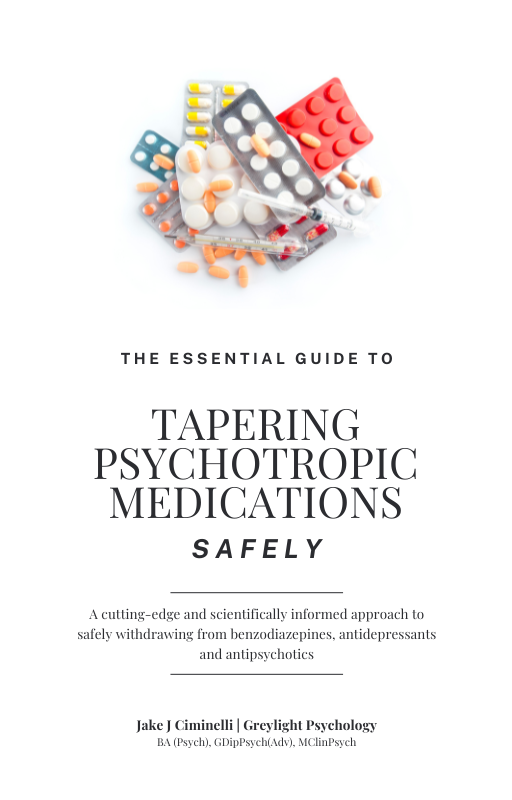 Image 1 of 1
Image 1 of 1


The Essential Guide to Tapering Psychotropic Medications Safely
Science-informed, step-by-step support for reclaiming your nervous system.
This self-paced guidebook is for individuals looking to reduce or discontinue psychiatric medications such as SSRIs, SNRIs, antipsychotics, and mood stabilisers—without risking destabilisation or unnecessary suffering. Written by a clinical psychologist and grounded in the latest withdrawal science, this guide offers a compassionate, research-aligned roadmap to safe tapering, with a strong focus on personal empowerment, informed consent, and nervous system support.
Whether you're preparing to taper now or seeking clarity after difficult past experiences with medication withdrawal, this guide is for those who want more than trial and error. It’s for people who want answers, strategy, and a supportive structure.
Note: This is not a substitute for medical advice, but an informed resource to bring into collaborative discussions with prescribers or health professionals.
Inside, you’ll find guidance on:
Understanding psychiatric drug withdrawal: symptoms, risks, and myths
Why slow, hyperbolic tapering is safest—and how to apply it
The neuroscience of receptor adaptation, withdrawal sensitivity, and tapering plateaus
How long-term psychiatric drug use affects serotonin, dopamine, glutamate, GABA, and neurosteroids
Assessing readiness to taper—psychological, physiological, and environmental considerations
Managing fear of relapse vs. withdrawal—how to tell the difference
Tapering strategies for specific medications (including SSRIs, SNRIs, and Seroquel)
Tips for reinstatement after a failed taper or abrupt stop
Nutritional and lifestyle supports for nervous system stability
How to track your taper, handle setbacks, and advocate for yourself with confidence
Science-informed, step-by-step support for reclaiming your nervous system.
This self-paced guidebook is for individuals looking to reduce or discontinue psychiatric medications such as SSRIs, SNRIs, antipsychotics, and mood stabilisers—without risking destabilisation or unnecessary suffering. Written by a clinical psychologist and grounded in the latest withdrawal science, this guide offers a compassionate, research-aligned roadmap to safe tapering, with a strong focus on personal empowerment, informed consent, and nervous system support.
Whether you're preparing to taper now or seeking clarity after difficult past experiences with medication withdrawal, this guide is for those who want more than trial and error. It’s for people who want answers, strategy, and a supportive structure.
Note: This is not a substitute for medical advice, but an informed resource to bring into collaborative discussions with prescribers or health professionals.
Inside, you’ll find guidance on:
Understanding psychiatric drug withdrawal: symptoms, risks, and myths
Why slow, hyperbolic tapering is safest—and how to apply it
The neuroscience of receptor adaptation, withdrawal sensitivity, and tapering plateaus
How long-term psychiatric drug use affects serotonin, dopamine, glutamate, GABA, and neurosteroids
Assessing readiness to taper—psychological, physiological, and environmental considerations
Managing fear of relapse vs. withdrawal—how to tell the difference
Tapering strategies for specific medications (including SSRIs, SNRIs, and Seroquel)
Tips for reinstatement after a failed taper or abrupt stop
Nutritional and lifestyle supports for nervous system stability
How to track your taper, handle setbacks, and advocate for yourself with confidence
